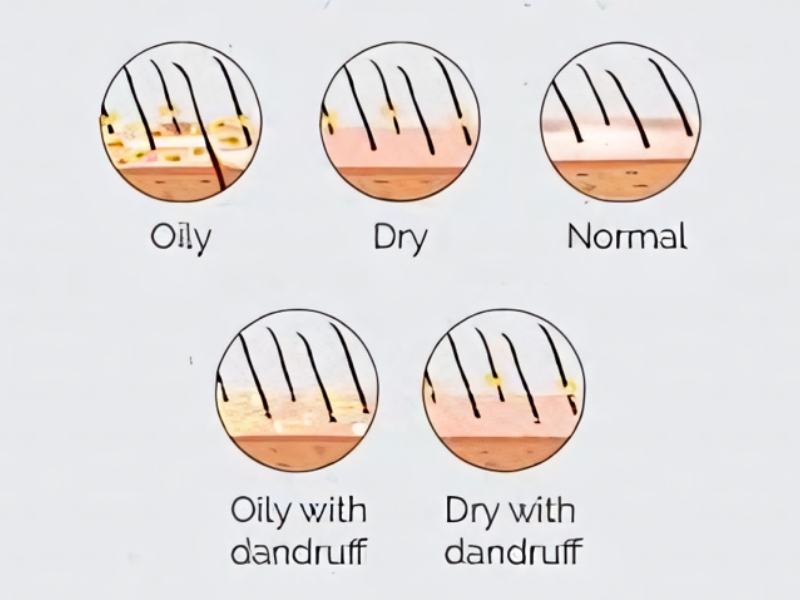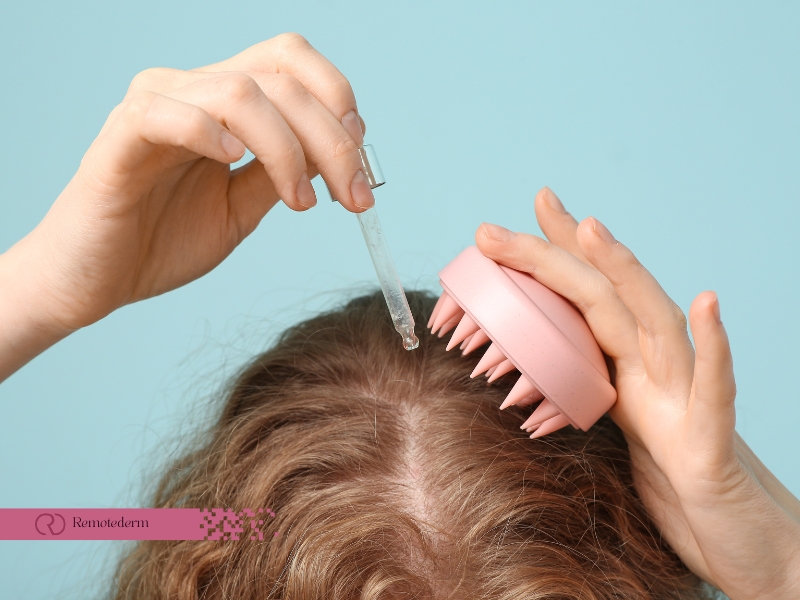Many people suffer from different types of scalp conditions that are quite annoying. Knowing about different scalp types can be beneficial for adequately managing and treating the condition. This article describes different scalp types, conditions, causes, and treatments available in Canada.
Different Types of Scalp
When people know their hair and scalp types, they can correctly choose hair treatment for scalp care and management.
1. Normal Scalp
A normal scalp is one that keeps a balance of oil production and thus doesn’t become too dry or too greasy. Normally, it doesn’t demand much maintenance, the hair is not treated with any dandruff and there is no flaking or irritation.
2. Dry Scalp
A dry scalp is devoid of hydration, which is why it becomes itchy and flaky and can be really uncomfortable. Sometimes, it can even look bad, with the flakes being confused for dandruff.
3.Oily Scalp
An oily scalp is the one which generates extra oil to the degree that it is hopelessly greasy and consequently needs a lot of washing to get rid of the oiliness and prevent the emergence of dandruff or acne.
4. Sensitive Scalp
A sensitive scalp is easily irritated and can become red or tender, for example, it can react to hair products and environmental factors. People suffering from a sensitive scalp should not resort to chemical treatments and one of the options to consider is to consult a dermatologist for customized care.
5. Combination Scalp
A combination scalp is characterized by both oily and dry traits, which is usually the case with the oily roots and dry ends. The management of it is a balanced hair care approach, a sometimes used mild shampoo regularly which is effective for both oiliness and dryness.

What Are the Different Types and Causes of Scalp Problems?
Preventing and managing scalp problems effectively is only possible if you know the different types as well as the causes of these problems.
Common Scalp Conditions
Different types of scalp conditions may affect the health and comfort of your hair. It is vital to have knowledge of the causes of these conditions, their treatments, and ways to prevent them.
1. Dandruff
Dandruff, which is a white flakes issue with itchy skin, can be the result of the overgrowth of yeast, dry skin, or product irritation. Treatment includes anti-dandruff shampoos and regular washing.
2. Scalp Psoriasis
Scalp psoriasis is an autoimmune disorder that causes red scaly patches and skin that is so itchy. The available treatment options include the use of medicated shampoos, topical steroids, and phototherapy for symptom management and the reduction of flare-ups.
3. Seborrheic Dermatitis
Manasseh’s yeast, stress, and hormones that fluctuate, or the scoring of the scalp are the main causes of seborrheic dermatitis. Treatments include anti-fungals, medicated shampoos, and the stress-removing education to manage the symptoms.
4. Folliculitis
Folliculitis is a hair follicle infection caused by bacteria or fungi which leads to pus-filled bumps, redness, and tenderness on the scalp. Hygiene of the scalp and antibiotics or antifungals treatment at once are very important for the clearing of the infection.
Causes of Scalp Problems
Understanding the various causes behind scalp conditions such as Scalp tenderness can help in effective management:
- Psoriasis is passed on through genes.
- Hormonal imbalances.
- Stress causes seborrheic dermatitis.
- Improper nutrition.
- Chemical pollution, extreme weather conditions such as Canadian weather, and a hard water supply.

How to Treat Different Types of Scalp Conditions
Treatment of different types of scalp condition is different according to the type of scalp you have. These are some customized interventions for controlling and elevating different scalp problems.
1. Dry Scalp
An adequate dry scalp treatment consists of the following variables: applying oil to the scalp, treating using therapeutic shampoo, and conditioners, and avoiding hot water preferably lukewarm water.
2. Oily Scalp
To manage an oily scalp use clarifying shampoos, wash the hair regularly to remove the excess oil, and steer clear of the heavy conditioners on the scalp in order to prevent further oil buildup.
3. Sensitive Scalp
Hypoallergenic and mild hair products should be the first choice, avoid tough chemicals and perfumes, and dermatologist advice is also the best for the most severe cases to make a hair care routine.
4. Combination Scalp
Products should be used to cater for both dry and oily parts, one mild shampoo for regular use and a stronger one, alternating, and focusing the conditioner on the ends instead of the roots to avoid the excess oil accumulation while providing moisture to the dry parts.
5. Scalp Massage
Scalp massage benefits for scalp health are proven as it promotes scalp blood circulation, reduces stress and tension, hair growth, and the distribution of natural oils.
Final Thoughts
Scalp care is essential for healthy hair function, but many people face scalp issues that cannot be solved with hair treatments alone and can impact overall comfort. Understanding the different types of scalp conditions is key to better managing and treating these problems. In Canada, there are various treatments available for different types of scalp conditions, addressing their underlying causes and offering effective solutions.
FAQs
- What is the best treatment for scalp tenderness? Scalp tenderness can easily be treated by keeping away from hair care products that are too strict, braiding your hair tightly.
- Can diet affect scalp health? Indeed, a balanced diet that is high in vitamins and minerals, especially vitamin E, B vitamins, and zinc, can actually first-rate scalp health.
- Is it safe to use medicated shampoos regularly? Medicated shampoos can be regularly used, as prescribed by a dermatologist, but it is essential to follow their instructions to avoid the danger of overuse.
- How frequently should I wash my hair with an oily scalp? If you have an oily scalp, washing your hair every other day can help reduce excessive oil secretion and protect the scalp’s moisture layer.
